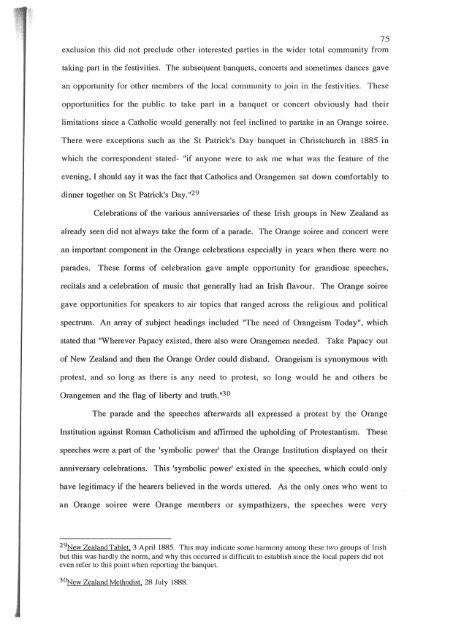TRANSPLANTED IRISH INSTITUTIONS - University of Canterbury
TRANSPLANTED IRISH INSTITUTIONS - University of Canterbury
TRANSPLANTED IRISH INSTITUTIONS - University of Canterbury
Create successful ePaper yourself
Turn your PDF publications into a flip-book with our unique Google optimized e-Paper software.
75<br />
exclusion this did not preclude other interested parties in the wider total community from<br />
taking part in the festivities. The subsequent banquets, concerts and sometimes dances gave<br />
an opportunity for other members <strong>of</strong> the local community to join in the festivities. These<br />
opportunities for the public to take part in a banquet or concert obviously had their<br />
limitations since a Catholic would generally not feel inclined to partake in an Orange soiree.<br />
There were exceptions such as the St Patrick's Day banquet in Christchurch in 1885 in<br />
which the correspondent stated- "if anyone were to ask me what was the feature <strong>of</strong> the<br />
evening, I should say it was the fact that Catholics and Orangemen sat down comfortably to<br />
dinner together on St Patrick's Day."29<br />
Celebrations <strong>of</strong> the various anniversaries <strong>of</strong> these Irish groups in New Zealand as<br />
already seen did not always take the form <strong>of</strong> a parade. The Orange soiree and concert were<br />
an important component in the Orange celebrations especially in years when there were no<br />
parades. These forms <strong>of</strong> celebration gave ample opportunity for grandiose speeches,<br />
recitals and a celebration <strong>of</strong> music that generally had an Irish flavour. The Orange soiree<br />
gave opportunities for speakers to air topics that ranged across the religious and political<br />
spectrum. An array <strong>of</strong> subject headings included "The need <strong>of</strong> Orangeism Today", which<br />
stated that "Wherever Papacy existed, there also were Orangemen needed. Take Papacy out<br />
<strong>of</strong> New Zealand and then the Orange Order could disband. Orangeism is synonymous with<br />
protest, and so long as there is any need to protest, so long would he and others be<br />
Orangemen and the flag <strong>of</strong> liberty and truth. "30<br />
The parade and the speeches afterwards all expressed a protest by the Orange<br />
Institution against Roman Catholicism and affirmed the upholding <strong>of</strong> Protestantism. These<br />
speeches were a part <strong>of</strong> the 'symbolic power' that the Orange Institution displayed on their<br />
anniversary celebrations. This 'symbolic power' existed in the speeches, which could only<br />
have legitimacy if the hearers believed in the words uttered. As the only ones who went to<br />
an Orange soiree were Orange members or sympathizers, the speeches were very<br />
2~ew Zealand Tablet, 3 April 1885. This may indicate some harmony among these two groups <strong>of</strong> Irish<br />
but this was hardly the norm, and why this occurred is difficult to establish since the local papers did not<br />
even refer to this point when reporting the banquet.<br />
3~ew Zealand Methodist, 28 July l888.
















